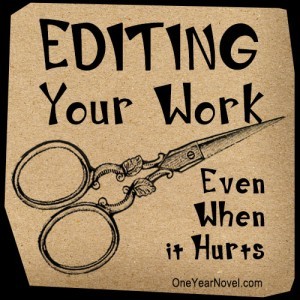When Something You Love Has to Go
Guest post by Justin Ferguson
We asked Justin, veteran student with The One Year Adventure Novel, about his novel-editing process. Below, Justin shares about the difficult moments when we have to edit against our emotions.
I tend to get a little too fond of my characters. In and of itself this isn’t such a bad thing—it’s hardly the worst that could happen—but here’s how it often plays out in my stories: I end up with thousands upon thousands of words devoted to characters sitting around and “having a chat” at various points in the plot.
Nothing actually happens in these conversations: the plot doesn’t move forward, the characters don’t develop much, and the conversations aren’t even that interesting—except to me. Or rather, the characters involved interest me. I’m the sort of person who likes to just sit and listen to other people talk, be they real or fictional. But none of this helps the story, and the result, of course, is bad pacing.
Because of this tendency I’ve had to learn what might be called the reviser’s motto: “Kill your darlings.”
Unless you’re new to the writing life, you’ve probably heard this phrase before. It refers to chopping out those scenes, plot points, and even characters that you just love but, if you’re honest with yourself, don’t serve the story. And that means they’ve got to go.
As writers, most of us know to be on guard against this natural weakness, but how do we go about killing our darlings? Whether you’re like me and tend to write a lot of fluff, or you’re a “bare bones” kind of writer whose rough draft is only the skeleton of your story, you need to figure this out. And because this editing process applies to plot points and characters as well as to scenes, in the latter’s case those bones may not be as bare as you first thought.
Here are a few lessons I’ve learned from experience:
1. WAIT
- So you’ve finished your rough draft. Great! Now put it away and forget about it. Seriously. When it comes to killing your darlings, it’s better to put it off. Not indefinitely, of course. But a month, minimum. Three months is better. Ideally you’ll wait long enough to essentially forget what you’ve written.
- When you come back to your story, you want it to seem new. Why? Simple: as Stephen King points out in chapter 11 of his book On Writing, it’s a whole lot easier to kill someone else’s darlings than your own. Sometimes we like to joke about how fun it is to kill things—usually characters. But killing something you have an emotional attachment to is not enjoyable. In fact it hurts. Sometimes a lot. Leaving your story alone for a while helps give you the distance you need when you do return: the novel is fresh and raw and unfamiliar. That’s good. You can approach it more objectively, and thus better see the flaws.
- So wait for a while. Maybe work on something else—a novella or a few dozen short stories. But forget about your novel for now.
2. LEARN WHAT TO CHOP
- When you read back over the story after letting it rest for a while, you should be able to see better what belongs and what doesn’t. This is why waiting is important.
- The general principle is that if it’s necessary and interesting, show us, and if it’s necessary but not interesting, tell us. If it’s not necessary but you think it’s still interesting? If it doesn’t advance the plot and/or develop characters? Cut it.
- This is what makes killing your darlings so hard: even after distancing yourself, you’re still likely to have a few of them in your manuscript, and darlings by definition are interesting to the writer and completely useless to the story—and, more often than not, boring to the reader.
- For the most part, you’ll be able to tell easily enough what needs to go. But you have to be honest with yourself. In my own experience, I like to fool myself into believing that I’m developing characters in these conversations and so they are necessary. But is it actually important to know what the ally’s favorite food is? Is he a more rounded character now? Sometimes these minor details do develop a character—but you probably don’t need six pages of dialogue leading up to this “big reveal.”
3. LET OTHERS CRITIQUE
- You won’t always be able to tell what needs to go. That’s where other people come in. Again, it’s much easier to kill someone else’s darlings than your own, so handing the hatchet to someone else can be really helpful. Let them tell you what they think needs to go; and take their advice into consideration.
- Remember that you may not have the clearest view of your story. They don’t either, because they didn’t write it, but that’s why help is important. We see each other’s blind spots.
4. CRITIQUE OTHERS
- This might seem out of place, but it goes hand in hand with what I’ve said already. Because it’s always easier to kill someone else’s darlings, you can practice on other writers.
- By reading other stories with a critical eye, you’ll develop a greater understanding of what matters and what doesn’t, what belongs in the story and what needs to be chopped. You can then take these insights back with you to your own novel. Plus, since it helps other writers, too, it’s a win-win.
I don’t enjoy revision. I wish I did. Turning a raw lump of words into the story we’ve actually envisioned just sounds so cool—and it is; it really is. And killing your darlings is a good thing, because it strengthens your story’s development and pacing. But (to risk being melodramatic) I still feel like I’m losing part of myself every time I hit that “delete” key. Maybe you feel the same way.
But look, we have to remind ourselves: just like parts of us have to die so we can grow as people, so parts of our novels have to die so the novel can become the story it’s meant to be. It hurts, but when we look at the finished product, it’s worth it.
 About Justin
About Justin
Justin has been a student with The One Year Adventure Novel for three years and has been writing novels for eight (and picture books and comics before that). He desires his stories to evoke a sense of wonder and longing in readers like his favorite stories do in him, and his two current projects are a dystopian-apocalyptic trilogy and a journey epic set in Atlantis. Justin lives in Canada but is a Texan, not a Canadian (though he does enjoy snowboarding and loves the warmer seasons of the Great White North).




Very nice post! I’m excited to see the difference in my perspective when I set that time aside before editing, because I was rather rushed with my OYAN novel. I know what you mean about killing your darlings, though. It’s not fun! But it’s certainly necessary. Thanks for sharing your thoughts, Justin!
Thank you and you’re welcome. 😉
I really enjoyed your article Justin. Your helpful advice would serve those writing long-winded emails as well. Thank you for tips on how to decide what must go — even though it hurts.
Glad you enjoyed it. I’m not sure most people can put 1-3 months aside between drafts of their emails, though — I usually don’t even know I’m going to write an email until about 10 minutes before I need to send it. 😛 But we are agreed that long-winded emails are not the most fun way to spend one’s time.
So the end of the second-to-last paragraph. I truly do feel that way.